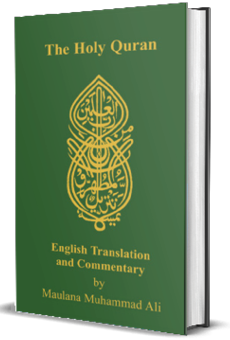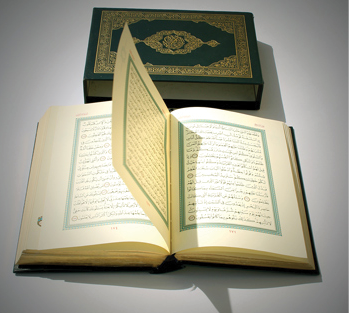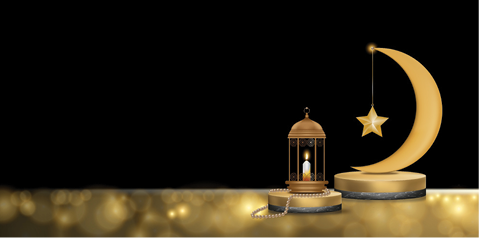“So set thy face for religion, being upright, the nature made by Allah in which He has created men. There is no altering Allah’s creation.
“That is the right religion—but most people know not—”
—Holy Quran, 30:30

This natural Guidance, which is the fiber of our existence, is referred to in Chapter 30, verse 30 of the Holy Qur’an in the Arabic word Fitrah. Allah (God) says in the Holy Qur’an that man is created in the best of molds in a nature of submission to His Will, as the crown of creation.
Allah (God), in fact, Teaches that man and all of creation are created in the nature of Islam, an Arabic word meaning peace that makes one secure. What is that nature? It is through this natural guidance instilled within our original disposition, the very fiber of our existence, that is referred to in Quranic terms as Fitrah.
As we now are quickly approaching the end of the Holy Month of Ramadan, a full month of fasting, self-correction and devotion, we will celebrate one of the Great Eid feasts and the Night of Power or Majesty. Muslims throughout the world have a joyous celebration through the exchange of gifts, festive activities, and service to the impoverished, and those in need of society.
Upon the sighting of the new crescent moon, Eid ul-Fitr marks the end of the fast of the month of Ramadan. It is a time of communal rejuvenation and spirit of our Faith, and it creates a stronger bond between the Muslim and his Lord.
Through the communal aspects of the fast and celebrations, we express many of the basic values of our Faith such as, empathy for the underprivileged, charity, worship, steadfastness, patience, and strengthened willpower and discipline—it is a true day of gratitude for believing men, women and children.
We seal our fast with a congregational prayer service, feeding of the most destitute or impoverished of our communities through what is known as Zakat-Sadaqat ul-Fitr, or the charity of the renewal of one’s nature. Prophet Muhammad (PBUH) is reported to have stated, “Hunger is the lord of all action.”

On this day Muslims are joyous for their health, family and the opportunities of life, which Allah has given to us to fulfill our obligation to fast and perform good deeds during the blessed month of Ramadan to seek the Favor of Allah. Our worship of Allah (God) through devotion in the form of the self-denial of our natural urges of thirst, hunger and passion are designed to return us to the innocence of the naturally instilled Guidance of our Original disposition by taming these natural hungers.
“Islam is actually our religion by nature,” writes the Honorable Elijah Muhammad, in “Message to the Blackman in America,” page 58. This major celebration of the Breaking of Fast, which is known as ‘Eid ul-Fitr—The Festival or Reoccurring Joy or Happiness—of the Renewal or Return to our Original Nature. Return to our Nature signifies a victory toward self-correction in our Acceptance of Self, our return to our innocent, inborn disposition from Allah (God) Himself.
On page 138 of “Message to the Blackman in America,” the Honorable Elijah Muhammad writes, “… Gathering of all people living in the same vicinity five times daily in the Mosque, is a help to the establishment of healthy social relations.
In the daily service these relations are limited to a narrow circle, i.e., to members of the same neighborhood. But the circle becomes wider in the weekly Friday service which gathers together all Muslim members of a particular locality and becomes still wider, in the two great ‘Eid’ gatherings.”
“Thus, prayer promotes social relations between the different sections of the Muslim community. Far more important than this, however, is the leveling of social differences brought about by means of congregational prayer. Once within the doors of the Mosque, every Muslim feels himself in an atmosphere of equality and love.”
Once we endure and overcome these internal forces that exploit our natural desires and inclinations with patience, prayer and service, Allah (God) aids us with increased guidance to expand our ability to overcome the call of our low desires and the external Satanic influences of the world.

The Honorable Minister Louis Farrakhan writes, “You are, by nature, a Righteous person. I don’t care what you’re doing; whatever you’re doing of evil is what you’ve learned by living in an evil world, but your nature is not evil, your nature is righteousness. —”The Restrictive Law of Islam is our Success,” page 10.
You do not love someone when they have done you wrong, because our nature is right and righteous judgment naturally rises. We may fall into the enemy’s tricks and lies and become sinful, but this is a learned behavior.
If we only find ourselves vainly fighting the tyranny of our own low desires but not having the strength to fight the tyranny of the enemy externally, we have become ritualistic and the Fast becomes ritual and loses its real meaning or value. We do it because we are supposed to do it. So, the prayer becomes ritualistic and the good deeds only practiced on occasions, when the ritual is what should be getting us into the practice of something much deeper.
It is related that the Prophet (PBUH) said: “Whoever fasts during Ramadan with faith and seeking his reward from Allah will have his past sins forgiven. Whoever prays during the nights in Ramadan with faith and seeking his reward from Allah will have his past sins forgiven. And he who passes Lailat al-Qadr in prayer with faith and seeking his reward from Allah will have his past sins forgiven.”
The reward for the one that struggles in the way of God against the passions—jihad al-akbar—is freedom from the fire of sin! The Holy Prophet Muhammad (PBUH) also said: “It (Ramadan) is the month, whose beginning is mercy, its middle, forgiveness and its end, freedom from the fire (of sin).”
Brother Sultan Rahman Muhammad serves as the Student National Imam of the Nation of Islam and resident Imam of Mosque Maryam National Center, Chicago. Visit NOI.org/ramadan, follow @ImamSultanM on Twitter, or email: [email protected].













